Many motorhomes, campers, and travel trailers use some form of a 12 Volt electric system to power lights.
Some also have onboard inverters that transform the 12 Volt DC current into the 110 used by most common appliances.
This begs the question, can you charge an RV battery with a generator? Technically, yes a generator can be hooked up in such a way that it can indeed charge a battery. Though there are different ways to do this, depending on the size of the generator, the state of the battery, and how the generator is being used in the RV.
In this article, we’ll take a look at how to charge a 12 Volt battery with a generator, how to maintain or preserve your RV batteries as well as other methods you can use to charge up or maintain your 12 Volt system.
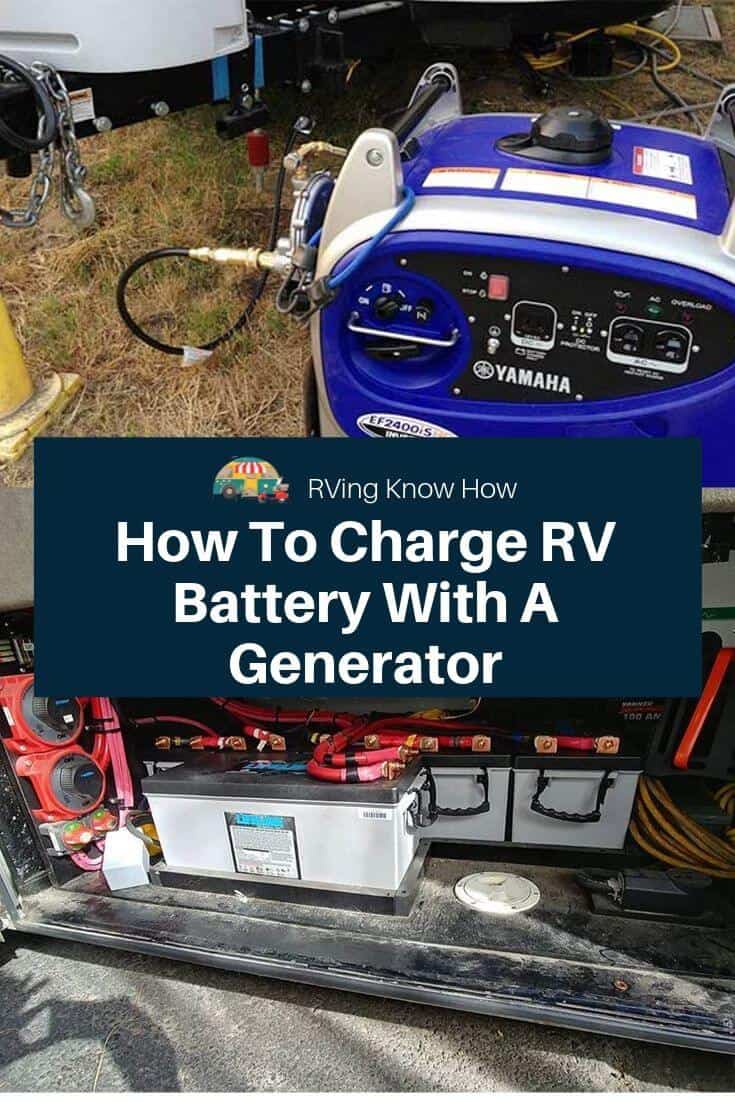
Is An On-Board Generator Charge A 12 Volt Battery?
Generators are not specifically designed to charge an RV’s on-board 12 Volt Batteries. Ideally, you want to use a smart charger, which is plugged into your home’s electricity or an RV parks shore power.
The 8 Amp power a generator produces will charge a 12 Volt battery, but it will be slow, and could tax the generator if it is also actively providing current for the RV’s appliances.
An RV with a built-in generator is designed to provide power to the RV’s internal lights and appliances.
If you are going to be running a generator for a few hours, and one of your 12 Volt system batteries is low, you might want to try connecting it to a smart charger.
Many generators have outlets that you can plug the charger into to take advantage of any excess power being produced.
How To Charge An RV Battery Using A Generator
Even though generators are not specifically designed to charge a 12 Volt Battery, most have the leads and connections to do it. They just have low amperage output which means it can take some time.
There are some specific steps you need to follow when charging RV battery with generator to make this work safely, and correctly.
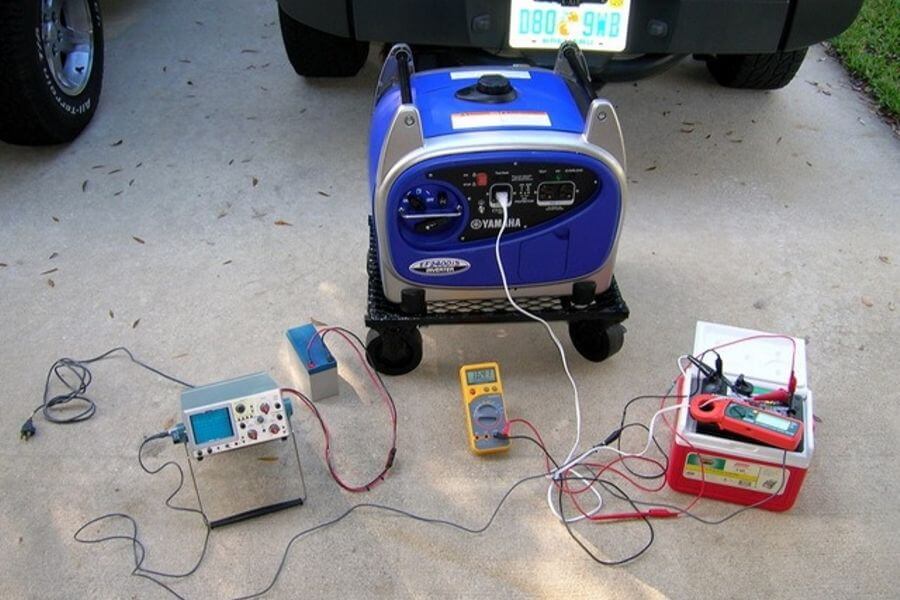
What Safety Steps Should I Keep In Mind While Charging RV Batteries
This is another one of those times where the term “Safety First” really does matter. Take a moment to inspect the wires and connections.
If the terminals look a little fuzzy or corroded, you need to take the time to clean them.
Also, make it a point to pay attention to red and black on the battery and the wire leads.
I know it sounds simple, but more than once I’ve seen someone be nonchalant and hook them up wrong, which can lead to disastrous results!
Will RV Batteries Charge When Plugged Into Shore Power?
Even when plugged into a reliable shore power source, an RV battery can still go dead.
However, if you are running the RV appliances strictly off shore power, the drain on the battery will be minimal.
Some motorhomes have power inverters that allow you to directly charge a 12 Volt battery off of shore power.
However, this can take quite some time, perhaps as much as four to six hours, depending on the specifications of the inverter and the size, or state of the battery.
Is It Possible To Charge An RV Battery Directly From Shore Power?
In my opinion, this is the best possible option. You don’t necessarily need to have RV park shore power.
If you have a 12 Volt battery charger, you can essentially charge a battery from just about any standard 110 electric outlets.
You can find battery chargers in just about any auto parts store or hardware box retailer. There are even some discount stores that sell them.
While a cheap $20 unit will get you by, I would recommend springing the extra money for a “Smart Charger.”
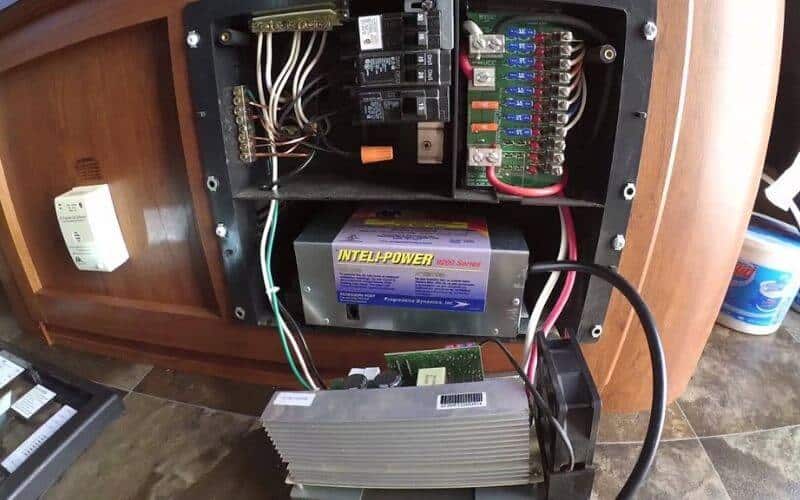
This type of battery charger essentially reads the power level of the battery, and won’t overcharge it.
A cheap battery charger just keeps dumping energy into the battery, which can eventually start to wear down the internal components and potentially damage the battery.
I even know someone who left a standard charger on a battery for over a day, only to come back and find the battery had overheated so badly that the seal failed and leaked battery acid on the floor!
A smart charger can set up for different types of 12 Volt battery. You can set it for lead-acid, or gel batteries, which will adjust the way it delivers the charge.
If you have the time, you can also set it for trickle charge, to maximize the stored power.
The smart charger will keep tabs on the battery’s power level and will throttle back to keep from overcharging and damaging it.
The ideal scenario is to plug the smart charger into shore power and let the battery charge up for a few hours.
With a smart charger, you can connect a single battery and let it charge up safely overnight.
Are There Other Alternative Charging Methods To Consider?
Some of the following methods are sound and easy to do, perhaps even ecologically conscious. Others are downright dangerous and should only be used in an emergency.
Charging A 12 Volt Battery With Jumper Cables
Right off the bat, this is a bad idea, and it should only be used in an emergency. I only mention it because I have seen many people attempt to improvise it when they are camping out in the bush.
It’s most common with rustic tent campers who need to recharge the 12 Volt trolling motor batteries on their boat.
Just like jump-starting a car, you hook the black to black, and red to red via a set of jumper cables. Then you start the vehicle’s engine.
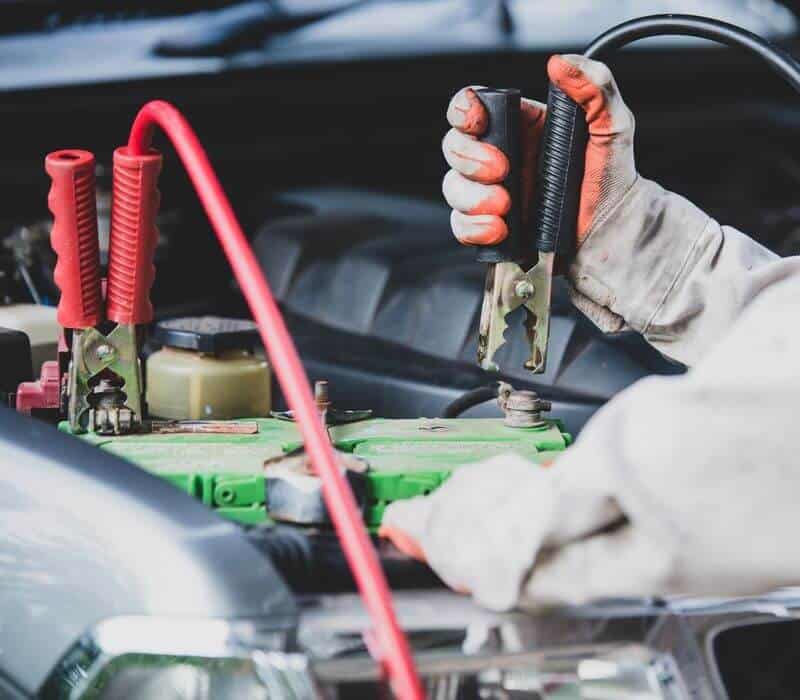
Technically some of the electricity produced by the alternator that isn’t used by the vehicle or the vehicle’s battery will go into the battery.
It helps to have the radio, lights, and other electrical components in the vehicle turned off.
Not only is this charging process very slow, but it is also hard on the alternator. I’ve done this with an F-150 pickup truck and I got away with it.
I know someone who tried to do this with a hatchback, and a few weeks later his alternator went out and needed to be replaced at a cost of $350!
Can I Charge My RV Batteries With Solar Panels?
Absolutely yes! This is a great option for charging up your 12 Volt batteries while you are on the move.
It’s especially handy if you have a “Two Way” refrigerator, and you want to run it on electric while you drive a motorhome from point A to point B.
Many hardware stores sell them for very cheap. You simply set it up in a generally south-facing direction, and let the photovoltaic cells transfer charge to the battery.
Just keep in mind, this is more about minimizing the drain on the battery than it is charging it up.
The wattage delivered by consumer-grade solar panels is still pretty low, and it could take more than a full day to recharge a dead 12 Volt battery.
Can I Charge My RV Batteries With A Wind Generator?
Again, this works just like the solar panel, only there’s a small turbine that spins and generates a charge.
They are sold in hardware stores and auto parts stores right next to the solar panels.
On a technical level, they are capable of generating more charge than a solar panel, depending on wind speed.
The faster the wind blows, the faster the turbine moves, and the more charge it generates.
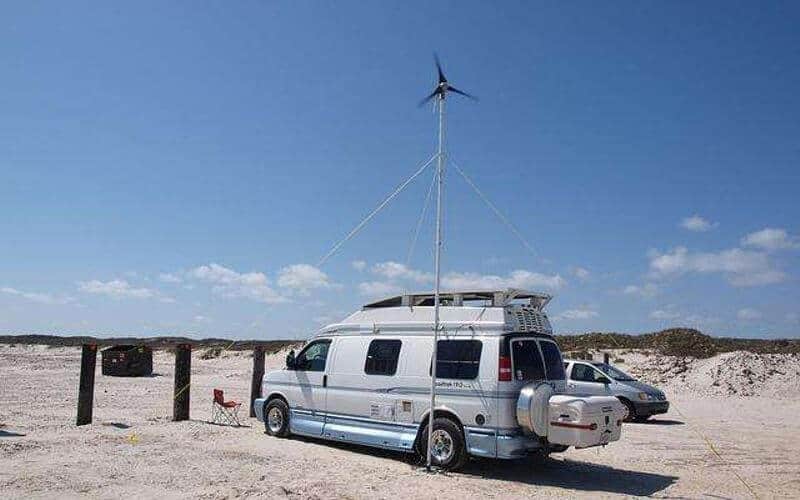
Just keep in mind that these units do have a “Maximum Wind Speed Rating.” Most can handle a strong breeze on a windy day, and even the occasional storm gust.
However, they are not invincible. I had a friend who attached one to his travel trailer and drove down the highway, expecting it to generate a massive amount of energy as the wind of driving at 60 miles per hour passed through the blades.
When he got to his destination his battery was still low and there were bits and pieces of the wind generator hanging from the roof of his camper.
What’s The Best Way To Clean Corroded Battery Terminals?
Battery terminals do experience the electrolysis effect. As time goes on this can cause corrosion to build up on the terminal posts, and other components.
When this happens, it impedes the alternator, generator, or battery charger’s ability to charge the battery.
Fortunately, cleaning them is relatively easy. You simply disconnect the leads. Mix a small amount of baking soda with a little water.
Then use an old toothbrush to gently scrub the corrosion away. Make sure to look closely at the connections and other hardware and clean them if necessary.
Before connecting, you can apply a light glaze of petroleum jelly. This will help prevent corrosion from developing in the future.

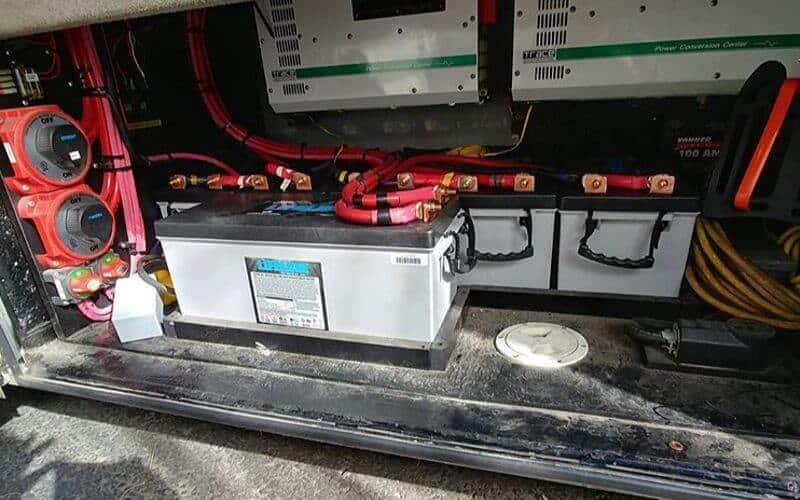
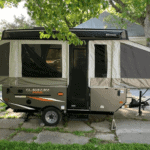
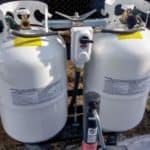
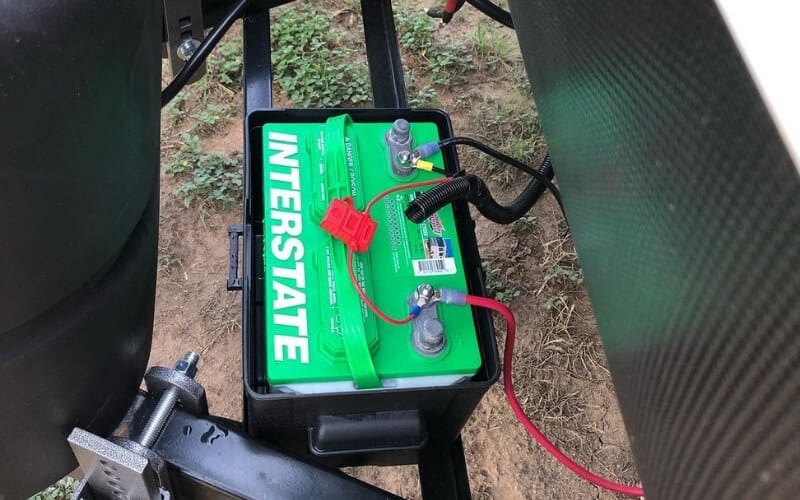
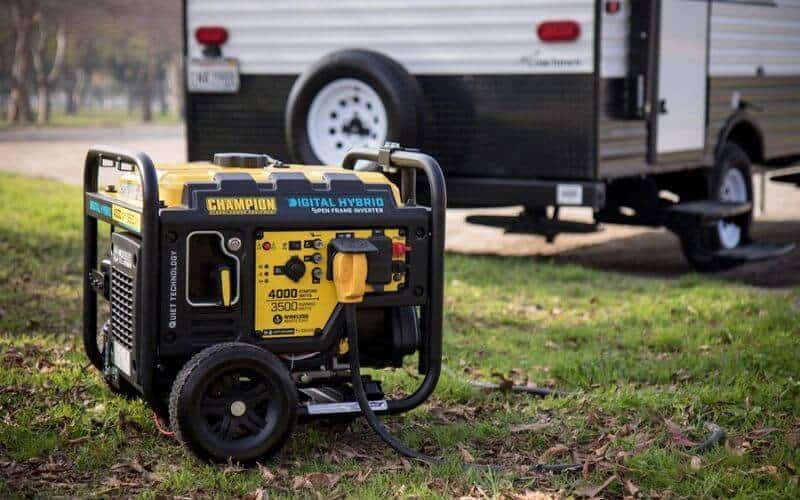
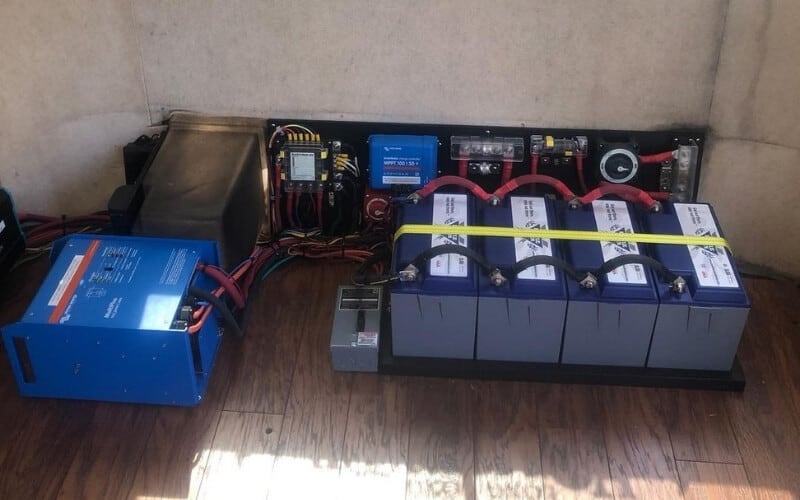
4 Comments
Andrew Pollard
4 years agoYour post very useful for me, I don’t want all my lights to go out in the middle of the camping. I would think of buying a generator. Thank you for writing this!!
Natalie Roberts
4 years agoAfter I read the article, with me running out of battery power while I am in the middle of camping is no longer that hard to deal with. I can charging RV battery with generator by the way you provided for me in article. Thank you for useful information!
Aaron Richardson
4 years agoHi, Natalie glad to know our writing help you somehow 🙂
Tom Brian
3 years agoRunning out of battery juice in the middle of a camping trip is no longer a problem. It’s because, thankfully, you can now recharge the battery using a variety of techniques, the most effective of which is utilizing the RV generator. Thank you for the information.